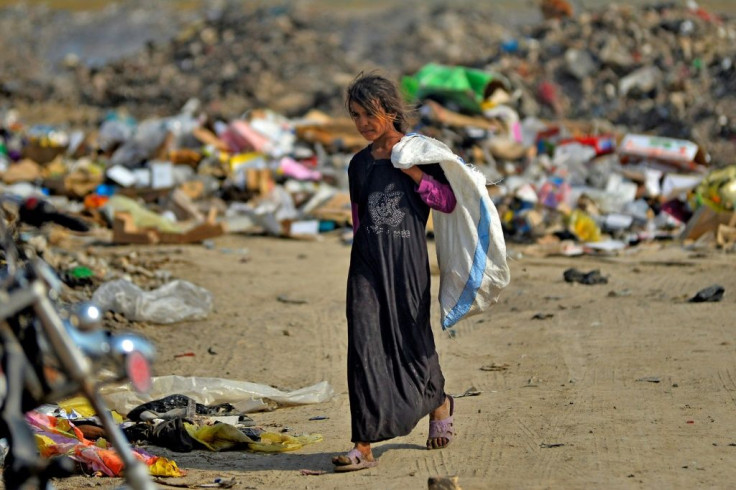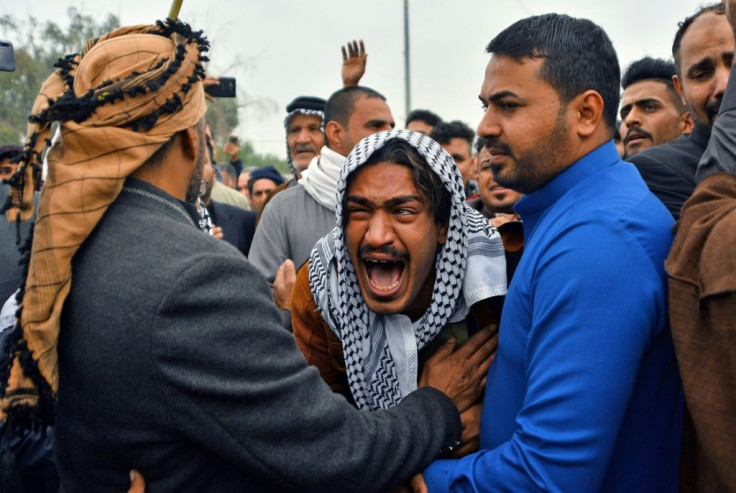Still In Streets, Iraqis Say Problem Is Poverty

Chants demanding complete regime change have echoed across Iraq for weeks, but what first brought demonstrators onto the street was the profound poverty of one of the world's most oil-rich countries.
And that is what has kept them there, with protesters brushing off the resignation of Prime Minister Adel Abdel Mahdi as failing to root out the rampant corruption that denies them jobs and public services.
In the southern protest hotspot of Diwaniyah, one of the poorest agricultural areas in the country, Umm Salah has joined rallies every day outside the provincial council.
"I've suffered in my country, even though it's a rich country," she told AFP, carrying an Iraqi tricolour.
The 57-year-old widow has been protesting every day since October with her seven children, none of whom are employed.
They walk four kilometres (nearly three miles) to reach the protest camp as they cannot afford a taxi from the worn-down informal shelter where they live.
"My husband died four years ago because we are poor and couldn't afford medical treatment in private clinics or hospitals abroad," Umm Salah says.
Iraq suffers from an extremely dilapidated health care system, with hospitals severely under-equipped and doctors often threatened on the basis of political or tribal disputes.
Despite Iraq being OPEC's second-largest crude producer, one in five of its people live in poverty and youth unemployment stands at one quarter, the World Bank says.
The government has been the largest employer by far for decades but has recently struggled to provide jobs for a growing number of graduates.
Already, youths make up 60 percent of the 40 million-strong population, which is set to grow by 10 million more before 2030.
The future looks even bleaker given predictions that heavy crude exports -- which fund more than 90 percent of Iraq's state budget -- will become less profitable as the world shifts to other energy sources.
For now, protesters blame the staggering joblessness rates on a patronage system that hands out work based on bribes, family connections or party affiliation instead of merit.
Muhannad Fadel, 30, dreamt of a government post when he graduated years ago with a degree in physical education, but his diploma opened few doors for him.
After a brief stint as a university lecturer, Fadel sought other work but his monthly income didn't rise above $100.
"I started to drive a taxi but I was afraid some of my students would recognise me," he told AFP.
"Then I opened a little confectionary store on the ground floor of our home and I make around 5,000 dinars a day," or just $3, he added.

Scraping together some savings, Fadel could marry but not buy a house, so his new wife moved in with his family.
"Our whole family together earns $150 per month. How is that possible in one of the countries with the most oil in the world?" he said.
For him and many protesters, the root of the problem is a political class more interested in earning money and paying homage to regional backers than in improving Iraqi infrastructure, or people's lives.
"They're corrupt and steal the people's money to give to Iran and other parties," Fadel said bitterly.
Iraq is ranked the 12th most corrupt country in the world by watchdog group Transparency International.
A recent government probe found over $450 billion in public funds were lost to embezzlement, fake contracts or salaries for so-called ghost employees since 2003.
"The deterioration of the economic conditions of Iraqis is the main reason for protests, as eight million Iraqis live under the poverty line," said Moussa Khalaf, an economic history professor in Diwaniyah.
A series of flare-ups before the major wave of protests erupted in October had hinted at the conflagration that was to come.
In September, local authorities began demolishing unauthorised houses in the shrine city of Karbala, in Basra in the south and in the central city of Kut.
The settlements are home to three million Iraqis, many of them the poorest of the poor.
That same month, a young man in Kut died after desperately setting himself alight when authorities seized his mobile kiosk.
"You need an economic policy that makes use of resources based on scientific and economic facts, not on privileges or political gains," says Khalaf.
Protesters have clung on in the streets and public squares even days after Abdel Mahdi stepped down.
"Of course that's not enough," one young demonstrator in Baghdad's Tahrir Square told AFP about bringing down the head of government.
"We won't leave our barricades until the regime falls, until we get jobs, water, electricity," he said.
Another protester, 45-year-old Hussein Maneh, slammed the government for its years of failure.
"Since 2003, they've done nothing but increased poverty, destroyed agriculture and industry, impoverished schools and hospitals, created confessionalism, and stole our oil," he fumed.
© Copyright AFP 2024. All rights reserved.




















